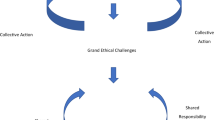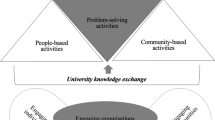Abstract
Can regulatory agencies become learning organizations? The purpose of this article is to assert that they can when the right learning mechanisms are in place. This article utilizes the literatures on US regulatory politics, organizational learning, and policy learning to elaborate the concept of learning mechanisms and examine the circumstances under which they are most likely to be utilized within regulatory agencies. The second half of the article examines the utilization of learning mechanisms within US drinking water regulation during the years when the drinking water policy community was working to formulate and implement the Safe Drinking Water Act Amendments of 1996 (1996–2015). The article concludes by summarizing the findings and offering some propositions for future research.
Similar content being viewed by others
References
Announcement of Preliminary Regulatory Determinations for the Contaminants on the Third Drinking Water Contaminant Candidate List, (2014) 79 Fed. Reg. 62716.
Announcement of Preliminary Regulatory Determinations for the Priority Contaminants on the Drinking Water Contaminant Candidate List, (2002) 67 Fed. Reg. 38222.
Announcement of Regulatory Determinations for the Priority Contaminants on the Drinking Water Contaminant Candidate List, (2003) 68 Fed. Reg. 42898.
Announcement of the Draft Drinking Water Contaminant Candidate List, (1997) 62 Fed. Reg. 52104.
Announcement of the Draft Drinking Water Contaminant Candidate List, (1998) 63 Fed. Reg. 10274.
Argyris, C., & Schon, D. A. (1978). Organizational learning: a theory of action perspective. Reading, MA: Addison-Wesley.
Argyris, C., & Schon, D. A. (1996). Organizational learning II: theory, method, and practice. Reading, MA: Addison-Wesley.
Armstrong, A., & Foley, P. (2003). Foundations for a learning organization: organizational learning mechanisms. The Learning Organization, 10(2/3), 74–82.
Birkland, T. A. (1997). After disaster: agenda setting, public policy, and focusing events. Washington, D.C.: Georgetown University Press.
Birkland, T. A. (2006). Lessons of disaster: policy change after catastrophic events. Washington, D.C.: Georgetown University Press.
Brown, M. L., Kenney, M., & Zarkin, M. (2006). Organizational learning in the global context. Aldershot, UK: Ashgate.
Busenberg, G. J. (2001). Learning in organizations and public policy. Journal of Public Policy, 21, 173–189.
Cook, B. J. (1988). Bureaucratic politics and regulatory reform: the EPA and emissions trading. New York: Praeger.
Daft, R. L., & Weick, K. E. (1984). Toward a model of organizations as interpretation systems. Academy of Management Review, 9, 284–295.
Dekker, S., & Hansen, D. (2004). Learning under pressure: the effects of politicization on organizational learning in public bureaucracies. Journal of Public Administration Research and Theory, 14, 211–230.
Derthick, M., & Quirk, P. J. (1985). The politics of deregulation. Washington, DC: Brookings Institution.
Drinking Water Contaminant Candidate List 2 – Final Notice, (2005) 70 Fed. Reg. 9071.
Drinking Water Contaminant Candidate List 2 – Notice, (2004) 69 Fed. Reg. 17406.
Drinking Water Contaminant Candidate List 3 – Draft, (2008) 73 Fed. Reg. 9628.
Drinking Water Contaminant Candidate List 3 – Final, (2009) 74 Fed. Reg. 51850.
Drinking Water Contaminant Candidate List 4 – Draft, (2015) 80 Fed. Reg. 6076.
Eisner, M. A. (1991). Antitrust and the triumph of economics: institutions, expertise, and policy change. Chapel Hill: University of North Carolina Press.
Eisner, M. A. (2000). Regulatory politics in transition (2nd ed.). Baltimore: Johns Hopkins Press.
Environmental Protection Agency (1996). The conceptual approach for contaminant identification. Washington, D.C.: Office of Water.
Environmental Protection Agency (2009). SAB advisory on EPA’s draft third contaminant candidate list. Washington, D.C.: Science Advisory Board, Drinking Water Committee.
Fiorino, D. (2001). Environmental policy as learning: a new view of an old landscape. Public Administration Review, 61, 322–334.
Gerlak, A. K., & Heikkila, T. (2011). Building a theory of learning in collaboratives: evidence from the everglades restoration program. Journal of Public Administration Research and Theory, 21, 619–644.
Glasbergen, P. (1990). Learning to manage the environment. In W. M. Lafferty, & J. Meadowcroft (Eds.), Democracy and the environment: problems and prospects (pp. 175–193). Cheltenham, UK: Edward Elgar.
Greener, I. (2001). Social learning and macroeconomic policy in Britain. Journal of Public Policy, 21(2), 133–152.
Habicht II, F. H. (1994). EPA’s vision for setting national environmental priorities. In A. M. Finkel, & D. Golding (Eds.), Worst things first: the debate over risk-based national environmental priorities (pp. 33–46). Washington, DC: Resources for the Future.
Hall, P. A. (1993). Policy paradigms, social learning, and the state: the case of economic policymaking in Britain. Comparative Politics, 25, 275–296.
Hazlett, T.W. (2011). Economic analysis at the Federal Communications Commission: a simple proposal to atone for past sins. Washington, D.C.: Resources for the Future. Discussion Paper #11–23.
Heclo, H. (1974). Modern social politics in Britain and Sweden: from relief to income maintenance. New Haven: Yale University Press.
Heikkila, T., & Gerlak, A. K. (2013). Building a conceptual approach to collective learning: lessons from public policy scholars. Policy Studies Journal, 41, 484–512.
Huber, G. P. (1991). Organizational learning: the contributing processes and the literatures. Organizational Science, 2, 88–115.
Jasanoff, S. (1992). Science, politics, and the renegotiation of expertise at EPA. Osiris, 7, 194–217.
Kagan, R. A. (2001). Adversarial legalism: the American way of law. Cambridge, MA: Harvard University Press.
Kerwin, C. M., & Furlong, S. R. (2010). Rulemaking: how government agencies write law and make policy (4th ed.). Washington, D.C.: Congressional Quarterly Press.
Lavey, W. G. (1993). Inconsistencies in applications of economics at the federal communications commission. Federal Communications Law Journal, 45, 437–490.
Levitt, B., & March, J. G. (1988). Organizational learning. Annual Review of Sociology, 14, 319–340.
Lowi, T. J. (1979). The end of liberalism (2nd ed.). New York: W.W. Norton.
May, P. J. (1992). Policy learning and failure. Journal of Public Policy, 12(4), 331–354.
McCubbins, M. D., Noll, R. G., & Weingast, B. R. (1987). Administrative procedures as instruments of political control. Journal of Law, Economics, and Organization, 3, 243–277.
Moe, T. M. (1989). The politics of bureaucratic structure. In J. E. Chubb, & P. E. Peterson (Eds.), Can the government govern? (pp. 267–329). Washington, D.C.: Brookings Institution.
National Drinking Water Advisory Council (2004). Report on the CCL classification process to the US environmental protection agency. Washington, D.C.: National Drinking Water Advisory Council.
National Research Council (1999). Setting priorities for drinking water contaminants. Washington, D.C.: National Academies Press.
National Research Council (2001). Classifying drinking water contaminants for regulatory consideration. Washington, D.C.: National Academies Press.
Nilsson, M. (2006). The role of assessments and institutions for policy learning: a study on Swedish climate and nuclear policy formation. Policy Sciences, 38(4), 225–249.
Oliver, M. J. (1997). Whatever happened to monetarism?: economic policy-making and social learning in the United Kingdom since 1979. Aldershot, UK: Ashgate.
Oliver, J. (2009). Continuous improvement: role of organisational learning mechanisms. International Journal of Quality and Reliability Management, 26, 546–563.
Oversight Hearing on the Environmental Protection Agency’s Implementation of the Safe Drinking Water Act’s Unregulated Drinking Water Contaminant Program: Hearing before the Committee on Environment and Public Works, Senate, 112th Cong. (2011). (Testimony of Robert Perciasepe). Retrieved at http://www.epw.senate.gov/public/index.cfm/2011/7/full-committee-hearing-entitled-oversight-hearing-on-the-environmental-protection-agencys-implementation-of-the-safe-drinking-water-acts-unregulated-drinking-water-contaminants-program
Pierson, P. (1993). When effect becomes cause: policy feedback and political change. World Politics, 45, 595–628.
Pontius, F. W. (2003). History of the safe drinking water act. In F. W. Pontius (Ed.), Drinking water regulation and health (pp. 71–103). New York: Wiley-Interscience.
Popper, M., & Lipshitz, R. (1998). Organizational learning mechanisms: a structural and cultural approach to organizational learning. The Journal of Applied Behavioral Science, 34(2), 161–179.
Raucher, R. S. (1996). Public health and regulatory considerations of the safe drinking water act. Annual Review of Public Health, 17, 179–202.
Regulatory Determinations Regarding Contaminants on the Second Drinking Water Contaminant Candidate List, (2008) 73 Fed. Reg. 44251.
Regulatory Determinations Regarding Contaminants on the Second Drinking Water Contaminant Candidate List – Preliminary Determinations, (2007) 72 Fed. Reg. 24016.
Request for Nominations of Drinking Water Contaminants for the Fourth Contaminant Candidate List, (2012) 77 Fed. Reg. 27057.
Rose, R. (1993). Lesson drawing in public policy: a guide to learning across time and space. Chatham, NJ: Chatham House Publishers.
Rosenbaum, W. A. (2014). Environmental politics and policy (9th ed.). Washington, DC: Congressional Quarterly Press.
Sabatier, P. A., & Jenkins-Smith, H. C. (Eds.) (1993). Policy change and learning: an advocacy coalition approach. Boulder, CO: Westview Press.
Safe Drinking Water Act Amendments of 1996. (1996). P.L. 104–182, August 6th, 1996.
Safe Drinking Water Act of 1974. (1974). P.L. 93–523, December 16th, 1974.
Shipan, C. R. (1997). Designing judicial review: interest groups, congress, and communications policy. Ann Arbor: Michigan University Press.
U.S. Government Accountability Office. (2011). EPA should improve implementation of requirements on whether to regulate additional contaminants. Washington, D.C.: GAO Report 11–254.
Williams, B. A., & Matheny, A. R. (1995). Democracy, dialogues, and environmental disputes: the contested languages of social regulation. New Haven: Yale University Press.
Zarkin, M. (2010). The FCC and the politics of cable TV regulation, 1952–1980: organizational learning and policy development. Amherst. NY: Cambria Press.
Zarkin, M. (2015). Unconventional pollution control politics: the reformation of the US safe drinking water act. Electronic Green Journal, 1(38). Retrieved from www.escholarship.org/uc/search?entity=uclalib_egj;volume=1;issue=38.
Author information
Authors and Affiliations
Corresponding author
Rights and permissions
About this article
Cite this article
Zarkin, M. Policy Learning Mechanisms and the Regulation of US Drinking Water. Public Organiz Rev 17, 275–291 (2017). https://doi.org/10.1007/s11115-015-0341-z
Published:
Issue Date:
DOI: https://doi.org/10.1007/s11115-015-0341-z




